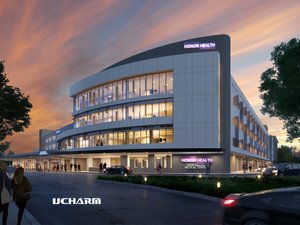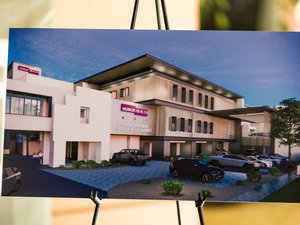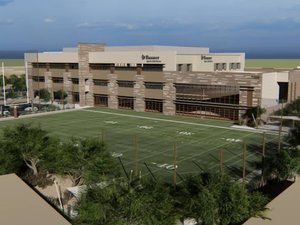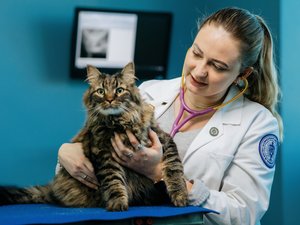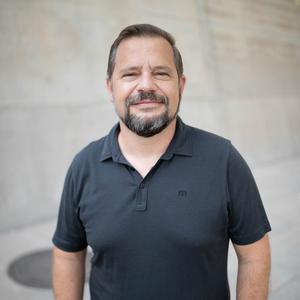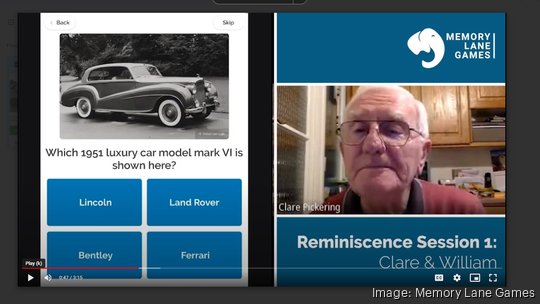
A British startup that designed an app for those living with dementia is considering moving its corporate headquarters to Phoenix.
"Hopefully one day soon our main headquarters might be in Arizona," said Brian Hall, vice president of UK-based Memory Lane Games. "It's been such a welcome here. Things that would take me three months in England get done in a week."
Hall is in town this week meeting with Mayo Clinic, Sun Health and more than half a dozen other memory care facilities that are using the app to help patients maintain their cognitive ability while dealing with memory loss.
The app, which has more than 50,000 downloads and is played in more than 100 countries, offers more than 3,000 quiz-style games on various topics, including music, food, hobbies and animals. Users also can customize games for patients and family members based around their own personal memories using their own photos.
"There is no score in the game. It is not a competition. It's about stimulating memory and conversation," Hall said.
The app will be free for consumers on the app store for about another month, Hall said.
Arizona a hub of Alzheimer's research
Arizona happens to be ground zero for Alzheimer's research and collaboration.
The Arizona Alzheimer's Consortium is the nation's leading model of statewide collaboration in Alzheimer's disease research, said Joan Koerber-Walker, president and CEO of Arizona Bioindustry Association Inc.
"Companies working to make life better for patients and caregivers living with the challenges of dementia — like Memory Lane Games — have the ability to connect within our community and tap into a collaborative network of people and companies that are making a difference today and will have an even greater impact in the future," she said.
Hall said home care companies also are asking about how they can offer the product to help their staff build relationships with their patients.
Memory care facilities pay $10 a month per bed for use of the app for their patients, he said.
The ability to communicate is something most of us take for granted, Koerber-Walker said.
"What was once effortless can become increasingly challenging for dementia patients and caregivers," she said.
The creation of the memory app
In 2019, Bruce Elliott and his friend Peter Quayle came up with the concept for the app in an Isle of Man pub chatting about how their mothers enjoyed looking at old photos and reminiscing, Hall said. They never intended to start a company.
But when more people kept downloading the app for their own family members suffering from memory loss, Elliott and Quayle started thinking there might be some commercial value to this concept, and they reached out to Hall about two years ago to help them build the business.
"Here's the app, play it with your mum," they told Hall.
His mother, who has since passed, had dementia at the time. He pulled up a photo of Manchester, where she grew up, and the app asks the viewer to name this particular area of Manchester, known as the Piccadilly area.
Instead of identifying Piccadilly, his mother began to describe to Hall that is where she would rendevous with his father when they first met. She described how they couldn't meet in one particular spot because that's where her brother lived, and her brother hated Hall's dad.
"We talked for 15 to 20 minutes and the lights were on in her eyes and she was sitting up laughing," Hall said. "My mom was back in the room."
He was instantly hooked.
The founders started working with memory care facilities in the UK, and conducted a clinical trial to make sure the app was safe.
They had been working with KPMG, and one of the executives who had done business in the U.S. suggested they take the app across the pond, as they say in England.
They were told to reach out to the Greater Phoenix Economic Council, which operates a Global Growth Accelerator program. They also connected with Debra Roubik, project manager for the AZ TechCelerator in Surprise.
"I rang Debra and told her about this crazy idea of people telling me to get on a plane and come visit," Hall said. "She said, 'Yeah, get on a plane. Tell me who you need to meet and i will try and get some people together.'"
That was in January.
"She hooked me up with the Arizona Coalition on Aging, a networking group for people who are working in age and memory care," Hall said. "We got an amazing reaction. We had people who were running care facilities in the Valley who said, 'Please come and see me so we can do this.'"
He was encouraged to apply for the MedTech Accelerator, a program of the Mayo Clinic and Arizona State University Alliance for Health Care.
"We applied and we were accepted into the accelerator," Hall said. "Of all the companies, we finished in first place with Mayo."
